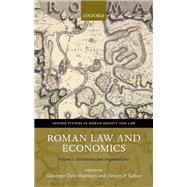Ancient Rome is the only society in the history of the western world whose legal profession evolved autonomously, distinct and separate from institutions of political and religious power. Roman legal thought has left behind an enduring legacy and exerted enormous influence on the shaping of modern legal frameworks and systems, but its own genesis and context pose their own explanatory problems. The economic analysis of Roman law has enormous untapped potential in this regard: by exploring the intersecting perspectives of legal history, economic history, and the economic analysis of law, the two volumes of Roman Law and Economics are able to offer a uniquely interdisciplinary examination of the origins of Roman legal institutions, their functions, and their evolution over a period of more than 1000 years, in response to changes in the underlying economic activities that those institutions regulated.
Volume I explores these legal institutions and organizations in detail, from the constitution of the Roman Republic to the management of business in the Empire, while Volume II covers the concepts of exchange, ownership, and disputes, analysing the detailed workings of credit, property, and slavery, among others. Throughout each volume, contributions from specialists in legal and economic history, law, and legal theory are underpinned by rigorous analysis drawing on modern empirical and theoretical techniques and methodologies borrowed from economics. In demonstrating how these can be fruitfully applied to the study of ancient societies, with due deference to the historical context, Roman Law and Economics opens up a host of new avenues of research for scholars and students in each of these fields and in the social sciences more broadly, offering new ways in which different modes of enquiry can connect with and inform each other.








